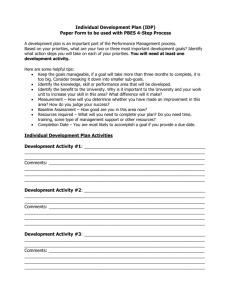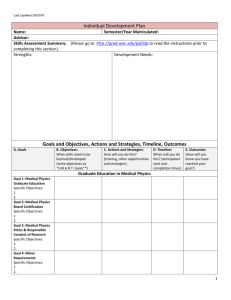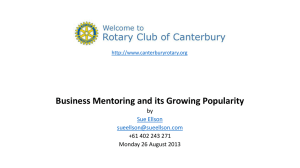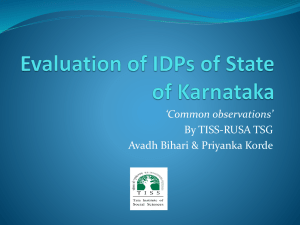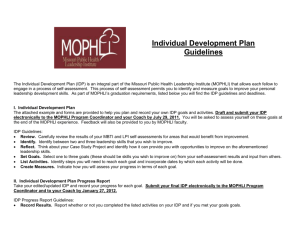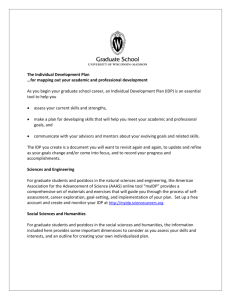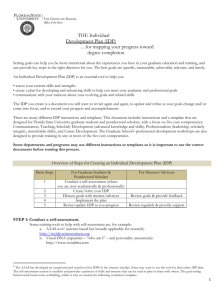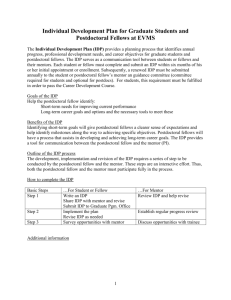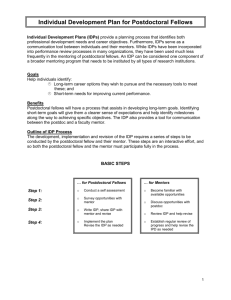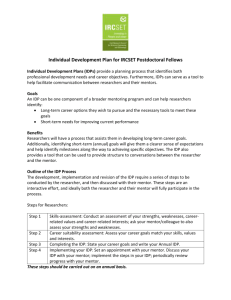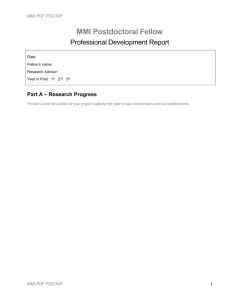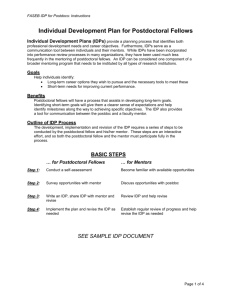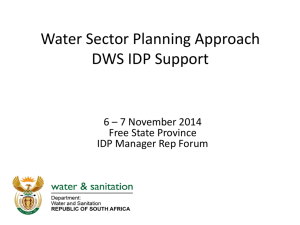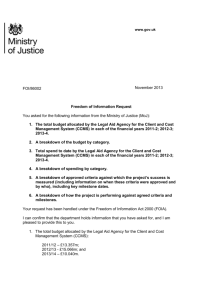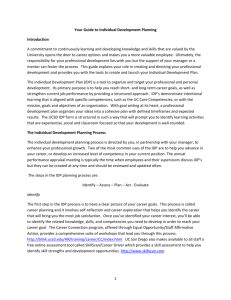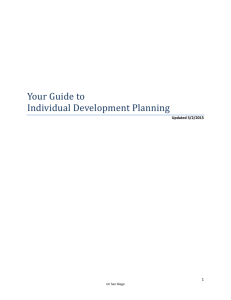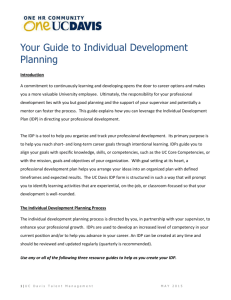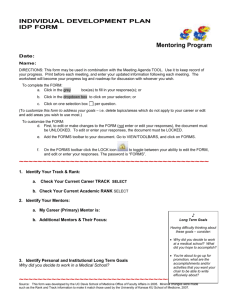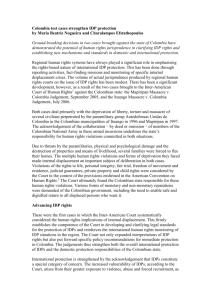Postdoc Research and Career Progress: Annual Review
advertisement
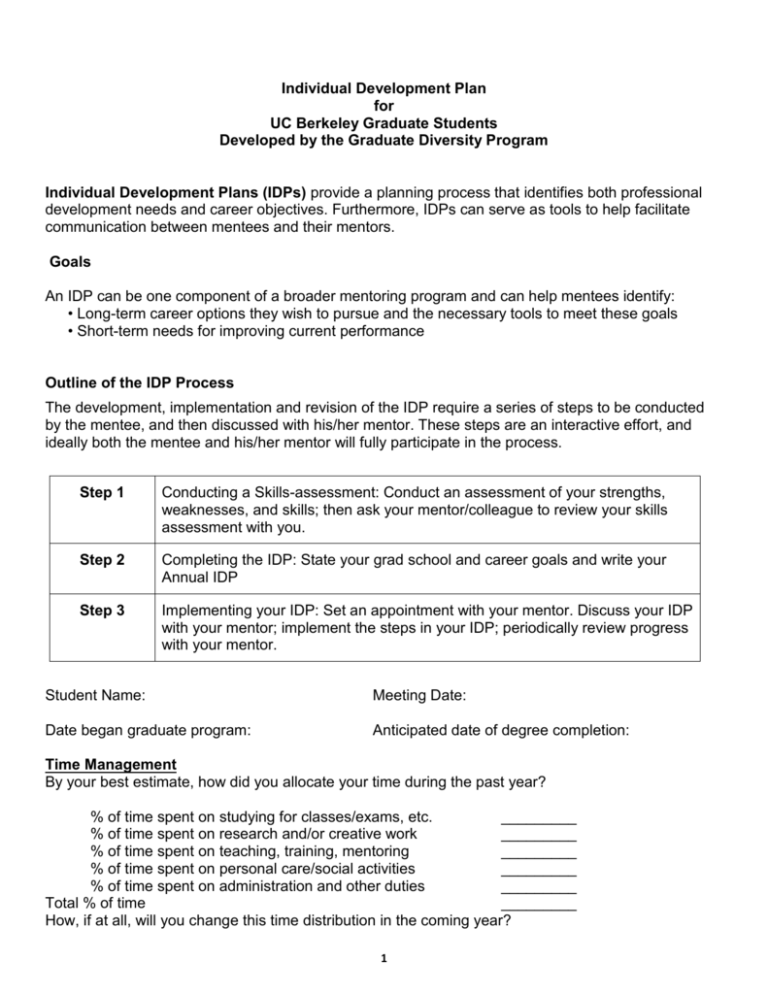
Individual Development Plan for UC Berkeley Graduate Students Developed by the Graduate Diversity Program Individual Development Plans (IDPs) provide a planning process that identifies both professional development needs and career objectives. Furthermore, IDPs can serve as tools to help facilitate communication between mentees and their mentors. Goals An IDP can be one component of a broader mentoring program and can help mentees identify: • Long-term career options they wish to pursue and the necessary tools to meet these goals • Short-term needs for improving current performance Outline of the IDP Process The development, implementation and revision of the IDP require a series of steps to be conducted by the mentee, and then discussed with his/her mentor. These steps are an interactive effort, and ideally both the mentee and his/her mentor will fully participate in the process. Step 1 Conducting a Skills-assessment: Conduct an assessment of your strengths, weaknesses, and skills; then ask your mentor/colleague to review your skills assessment with you. Step 2 Completing the IDP: State your grad school and career goals and write your Annual IDP Step 3 Implementing your IDP: Set an appointment with your mentor. Discuss your IDP with your mentor; implement the steps in your IDP; periodically review progress with your mentor. Student Name: Meeting Date: Date began graduate program: Anticipated date of degree completion: Time Management By your best estimate, how did you allocate your time during the past year? % of time spent on studying for classes/exams, etc. _________ % of time spent on research and/or creative work _________ % of time spent on teaching, training, mentoring _________ % of time spent on personal care/social activities _________ % of time spent on administration and other duties _________ Total % of time _________ How, if at all, will you change this time distribution in the coming year? 1 STEP 1: SKILLS ASSESSMENT Assess your strengths, weaknesses and skills – Self-Evaluation Evaluate your skills and abilities in the following areas where: 5 = Highly proficient 1 = Needs improvement General Research Skills: Designing program evaluations/studies Analytical skills Problem solving/troubleshooting Creativity/developing new research directions 1 2 3 4 5 1 1 2 2 3 3 4 4 5 5 1 2 3 4 5 1 1 1 2 2 2 3 3 3 4 4 4 5 5 5 1 1 1 1 1 2 2 2 2 2 3 3 3 3 3 4 4 4 4 4 5 5 5 5 5 Teaching Skills: One-on-One Teaching Small Group Teaching Large Group Presentation Professional Skills: Grant writing skills Oral presentation skills Manuscript writing skills Mentoring skills Being a mentee Leadership and Management Skills: Leading and motivating others Budgeting Managing projects and time Organizational skills 1 2 3 4 5 1 1 2 2 3 3 4 4 5 5 1 2 3 4 5 1 1 2 2 3 3 4 4 5 5 1 2 3 4 5 Interpersonal Skills: Getting along with others Communicating clearly in writing Communicating clearly in conversation When you have completed this self-evaluation, discuss the items on the form above with your mentor(s). 2 Please complete Parts 1-5 and return it along with your current CV to your faculty advisor at least two days prior to the scheduled meeting. You can type as much as needed in each section, but please respond in brief, bulleted format. This is not to be a complete report, but a summary to guide discussion. It is not intended that this become part of your permanent record. Part 1. Progress in the Last Twelve Months Please attach a copy of your current Curriculum Vitae (CV). List any program requirements that you completed this year. For example, coursework, requirements for advancement to candidacy, examinations, and teaching: List members of your Dissertation /Thesis Committee: Give a brief overview of your overall progress on your research project(s) and dissertation/thesis in the past year. Describe any research activities in which you have experienced or are experiencing difficulties. What factors caused or contributed to these difficulties? **What assistance, resources, or mentoring might help you accomplish your research goals? Give a brief overview of your teaching and mentoring activities in the past year. Describe any such activities in which you have experienced or are experiencing difficulties. **What assistance, resources, or mentoring might help you accomplish your teaching goals? Give a brief overview of your other professional activities, recognition and accomplishments in the past year (e.g., publications, patents, honors or awards, presentations at professional meetings, grants or fellowships): 3 Part 2. Plans for the Coming Twelve Months List any program requirements yet to be completed, along with anticipated dates of completion. For example, coursework, requirements for advancement to candidacy, examinations, teaching, etc. Briefly describe the goals for your research project(s) and dissertation/thesis : List publications you plan to submit (include proposed publication title, journal, and submission date): List professional conferences, meetings and workshops you would like to attend (include proposed title and submission date for proposed presentations), along with funding resources to attend them: How will your doctoral studies be funded next year (e.g., GSR, Fellowship, GSI)? List fellowship, grants, and other funding applications you plan to submit (include name of award and due date): **What areas of expertise/understanding and skills would you like to develop in the next year? Think broadly of what you need to be able to know and do: new areas of knowledge, new research techniques, public speaking, writing, managing teams, classroom teaching, negotiation, etc. List your plans for learning these. Part 3. Career Goals and Progress List your long-term career goals. You are encouraged to include at least two: 1) 2) What position/job do you see as the next step toward your career goals after graduating? When do you anticipate beginning the process of obtaining that next position? 4 What factors are driving your career goals, plans, and decisions (e.g., interests in research, teaching, business, government, writing; geographic priorities; family commitments; financial objectives)? What steps are you taking to enhance your ability to attain these goals? What additional training or skills would most benefit you in preparing for your desired career? Part 4. Final Discussion Points This final section is an opportunity for you and your advisor/mentor to develop action plans for the coming year and to reflect on specific actions that will help you be successful. It is useful to consider what is working and should continue, and what might change. This is an opportunity to come to closure on key issues, as well as to discuss any matters not already covered. **What assistance, resources, and mentoring would help you meet your goals? What are your plans for identifying and using these resources? What can your advisor continue to do to support you in reaching your specific research and professional development goals for the coming year? What can your advisor do differently to best support you in reaching your specific research and professional development goals for the coming year? What can you continue to do to achieve your immediate and long term goals? What can you do differently to achieve your immediate and long term goals? 5 Part 5: IMPLEMENT YOUR PLAN Writing out your IDP is just the beginning of the career development process and serves as the road map. Now it’s time to take action! Put your plan into action. File it someplace easy to find and read it over regularly to check your progress. Remember that each major professional goal that you write for the upcoming year should be broken down into its smaller, accomplishable sub-goals, steps or “deliverables”, with specific dates for completion for each of those sub-goals. These smaller sub-goals should ultimately lead to accomplishment of the final goal. For example: Major goal: Submit a paper for publication. Completion date - March Sub-goal #1: Complete data analysis, figures and outline. Completion date - previous October Sub-goal #2: Complete the Introduction section. Completion date - previous November Sub-goal #3: Complete the Discussion section. Completion date - previous December Revise and modify the plan as necessary. The plan is not cast in concrete; it will need to be modified as circumstances and goals change. The challenge of implementation is to remain flexible and open to change. Plan to set an annual (or more frequently if appropriate) meeting with your mentor(s) to review and discuss your IDP. Be sure to prepare a written outline for this discussion. For example, create a prioritized list of the most important items you wish to discuss. Revise your IDP on the basis of these discussions. Adapted from Stanford University’s Annual Doctoral Student Degree and Career-Progress Meeting Worksheet, and UCSF’s Individual Development Plan for UCSF Faculty . 6
